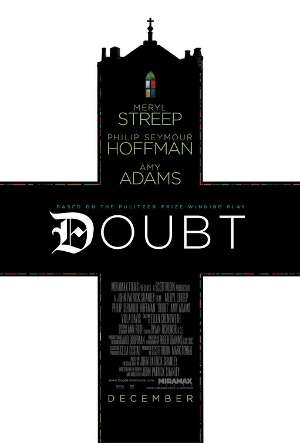- Title: Doubt
- IMDB: link

“But I have my certainty.”
 At the heart of the film written and directed by John Patrick Shanley, who adapted his play for the screen, is the issue of change vs. the status quo. Set in the Bronx during the 1960’s the film deals with the conflict between the more liberal priest, Father Flynn (Philip Seymour Hoffman), and the older Sister Aloysius Beauvier (Meryl Streep).
At the heart of the film written and directed by John Patrick Shanley, who adapted his play for the screen, is the issue of change vs. the status quo. Set in the Bronx during the 1960’s the film deals with the conflict between the more liberal priest, Father Flynn (Philip Seymour Hoffman), and the older Sister Aloysius Beauvier (Meryl Streep).
Set between the pair is the good-natured Sister James (Amy Adams) who is the catalyst for the story when her observance of events causes Sister Aloysius to believe, with certainty, that Father Flynn has taken improper advances with a young black student (Joseph Foster).
Is the accusation real, or is it simply an excuse for the traditional nun to get rid of the crazy priest and his new-fangled ideas? Is there room, for doubt?
What the film attempts to do over the course of its running time is to present both sides, Sister Aloysius’ suspicions and Father Flynn’s insistent innocence, without proof either way. Had the film done this I, no doubt, would be giving it higher marks.
The problem is both arguments are not presented equally. Streep’s nun is is full of righteous furor and certainty but lacks anything resembling conscious thought or a single shred of something more substantial than idle gossip. Although the events shown in the film do suggest the possibility of such a relationship taking place there is nothing shown, or even suggested, to give equal weight to Sister’s Aloysius’ position.
Just as she questions Father Flynn, the film also puts Sister Aloysius’ faith itself on trial, which, in almost every single way, comes out more guilty than the priest. The final scene, which I won’t spoil here, would have been more powerful if equal credence, aside from her cocksuredness, of Father Flynn’s impropriety, had been demonstrated. Instead we are given the choice between an old crone who cares nothing for facts and a kind priest who cares about his flock. Who are you going to believe?
Of all the performances here Streep is getting the most acclaim, which I find a bit funny since it’s the most one-note, though still strong, performance of the piece. Personally I was more impressed with Amy Adams who was given the harder role to deal with increasing doubt on all sides, and Hoffman as an increasingly desperate man who sees his life attacked by a woman who feels her belief is more important than facts. The nun’s personal dislike solely fuels her crusade when a little more evidence might have helped. Had the film been able to remain a bit more balanced (and if sister Alosius was just a little less self-obsessed) I, no doubt, would have enjoyed the film more. I’m still recommending it for some fine performances and some nice and subtle camera work, but I’m certain it’s not the film it should have been.
